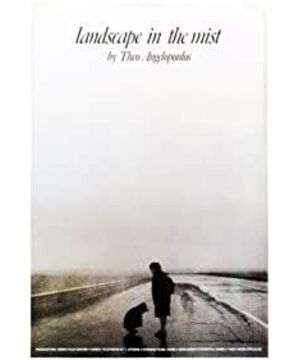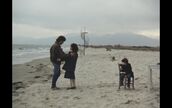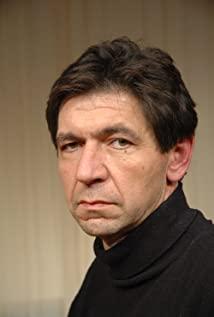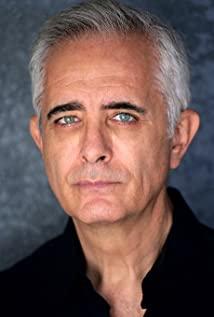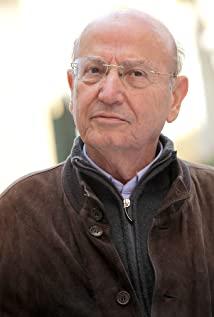Landscape in the Fog, along with Journey to Sether and The Beekeeper, and called the Silence Trilogy .
The director is Theodoros Angelopoulos , who was born in Greece and is known as the last film master in the world. His works have won many international film festival awards in Berlin, Cannes, Venice, Chicago and Europe.
Together with Poland's Krzysztof Kieslowski and Spain's Pedro Almodóvar , he formed the last "master front" of European cinema.
Influenced by ancient Greek philosophy, mythology, poetry and literature, Angelopoulos has always rooted his film aesthetics in Greece, not only innovating the language of film, but also integrating European reality, history, and art into fables. , reconstructs a European utopian world in a quiet, intellectual, melancholy and painful way.
His first feature-length debut, "Reconstruction," takes place in the poorest part of northern Greece. Young people leave the countryside to work in Germany. An immigrant returns home to visit relatives, but is killed by his wife and lover. The film reconstructs the facts at a slow pace, not focusing on the plot, but starting from the causes and motives of the events, reflecting the decline of Greek culture. After that, most of the works were built on the basis of "Reconstruction", and most of them were also related to wandering .
Under the foggy southern European weather, people struggled to find the root of their spirits, and the pain of their bodies and minds all reflected the deep shadow of the Cold War for Europeans in the 1970s. It is in this creative context that Angelopoulos expresses the lost of contemporary people with images .
As a "silent trilogy" that mainly describes people's wandering experience on the journey, "Landscape in the Fog" is undoubtedly the best one. The film tells the story of a father search in the late 1980s . Sister Ulla and younger brother Alexander accidentally learned from their mother that their father they had never met was far away in Germany, and they decided to embark on the arduous road to find their father. Every night Alexander and Ulla go to the train station to watch the train to Germany, because they believe their mother's lie: that their father lives in Germany. In order to strengthen his younger brother's belief, Ulla also told his younger brother the story of God's creation of light in the Book of Genesis.
One night, they finally dared to jump on a train bound for Germany, and the series of encounters that followed were two young children, tying their fate to the cruelty of the adult world. There was the flight attendant who drove them off the train, the uncle who told them they were illegitimate children, the truck driver who sexually assaulted Ulla, the touring artist Orest who brought them a brief warmth, and the soldier who gave them travel expenses. During this period, Ulla developed hazy feelings for Oreste, a troupe actor, who was gay. Until finally, they reach the border, and the other side of the river is Germany, but where is the end of the journey, can they get to "Germany"?
A desolate station on a winter night, a train, a waiting room, a hotel, a truck, a motorcycle, a touring theater company, a road, a giant mining truck, an unfinished bar... Two children looking for their husbands, with hope and despair, And those condensed lights, desolate streets, and foggy nights, in the illusory and reality, search and loss, step by step to the "big tree" hidden behind the discarded film, this is a root-seeking journey, and an endless one. 's travel.
The film uses a large number of long shots, medium and long shots, and fixed camera positions, trying to create the protagonist's insignificance, loneliness, and helplessness, as well as the hopeless hope of finding his father. The shot is also full of poetic rhythm . For example, in this snowy scene, except for the running figures of the sister and brother, the rest of the scenery and passers-by are still, and the romantic sadness also spreads out, composing a lingering song. image poems.
" In the beginning it was pitch black and then there was a ray of light that came from the darkness and then the earth emerged from the sea and then there were rivers and lakes and then there were high mountains and flowers and trees and animals and birds appeared... ...
"
It was always an endless story, because every time my sister Ullah recited the Book of Genesis to her younger brother Alexander, she was interrupted by her mother's nudge on the door, and a light piercing the darkness through the crack of the door. Just like the journey they experienced afterward, "father" and "Germany" are just a metaphor throughout the film. Whether it exists or not is like the thick fog, which is looming and elusive. It may be the ideal paradise in the child's heart, or it may be some kind of destination, and the long journey of the two children is full of hope and unknown like a tree faintly visible on the broken film.
In the Western context, there is an uppercase Father—God. After creating light and darkness, the heavens and the earth, and all things, he created human beings. Humans were born in the foggy landscape. After that, he was expelled from the Garden of Eden and scattered all over the world. This is why, for thousands of years, mankind has never stopped returning to the paradise of the Father and seeking the ideal of eternal life. The title of the film "Landscape in the Fog" is actually a search for the father, the place where human beings return to their birthplace, that is, returning to their hometown.
And the hero Odysseus in "The Odyssey", after more than ten years of wandering at sea, overcame various difficulties with firm belief and moved the gods to finally return to their hometown. (The reference to "The Odyssey" is also mentioned in the movie "The Reader") The process of returning home is the process of ending wandering, which is similar to the Tang monk returning to the Western Heavenly Holy Land to which he belonged in his previous life or the literati in ancient poems. The "Thinking of Jailing", which is sung over and over again, has something in common. Returning to the hometown requires overcoming many difficulties, firm belief and determined courage, and the light of human nature bursts out in the layers of tempering. The process of returning home is also a noble process of human nature, a struggle of free will against destiny, and a human nature towards divinity The process of getting closer.
(The above two paragraphs refer to the film review "Always on the Road" from "Sleep late and wake up late")
Back at the beginning of the film, on top of the vast ruins that were torn down and rebuilt by industrial civilization, Alexander shouted vigorously to a man imitating seagulls spreading their wings and flying: Hello seagull! Mr. Seagull said indifferently: It's going to rain, and my feathers are going to get wet. In the film, many scenes with this sense of ritual and the dialogue like a stage play also outline the gradual decline of the splendid ancient Greek culture under the attack of modern civilization and ancient civilization, and people's spiritual world has become blind and empty in the cracks. Unlike Mr. Seagull's formalized flight, Ulla and Alexander were witnesses to this "flying". He lay on the barbed wire and said to Mr. Seagull, "I'm going to Germany." A simple farewell became the only witness to the beginning of their journey, and the biological mother was unaware. Mr. Seagull said: You go to Germany every day; the station salesman said: Why are you here every night. It is not difficult to see from the mouths of these bystanders that this is a long-planned journey, and their mother cannot give them a real family atmosphere and destination.
Ulla: Are you afraid?
Alexander: I'm not afraid.
Announcement: Please note that the 290 express to Germany has now arrived at track 1 and will depart at 21:00.
After successfully boarding the train for the first time, the siblings huddled in the corridor of the carriage, and a letter to their father explained the origin of the whole story. It was this father whom they had never met but missed very much, a topic they talked about countless times, their incomprehension with their mother, and the imagination of young Alexander about his father, that became the only motivation and hope for the long journey. As the letter said: Sometimes when I come home from school, I hear footsteps behind me, and when I turn around, I find that there is no one there. I don't want to be a burden on you, we just want a chance to get to know you and then we'll turn around and leave. If you want to reply to us, please accompany the sound of the train, tatan, tatan... The sound of the train has become the only support for the two brothers and sisters who depend on each other, as if the father's response came from the depths of the rails.
After arriving at OINOH station, she was kicked off the train by the flight attendant because she had no ticket. Ulla lied that she was looking for her uncle and sent it to the police. The police took them to find their uncle who works in the factory, but the relative claimed that he had not been in contact with his sister for many years and did not want to be involved or be responsible. The film tells the truth in the tone of my uncle: the whole thing is a big cover, there is no father and no Germany, and the mother is able to lie to hide the fact that they are illegitimate children. As for why it is Germany, it may just want to give the child an imagination about his father.
After her uncle told the truth, Ulla still didn't believe this fact, and firmly believed that her uncle was lying. In the police station, a heavy snow fell in the sky. At this time, the director took advantage of the staff to go out to enjoy the snow, and deliberately set up a barrier-free passage for them to travel again. Except for Ulla and Alexander running in the snow.
After the second successful train ride, the same carriages and corridors, only this time the content of the letter has changed.
Dear Father: Why are we waiting so hard? What a strange world we are tossing in the wind like a fallen leaf! Suitcases, icy railway stations, words and gestures we don't understand, and this terrifying long night. But we're happy, at least we're moving forward.
Yes, how strange, how terrifying, how incomprehensible the world is!
After being kicked off the train for the second time, they witness a bride fleeing a wedding on a snow-covered street, and a horse dragged to death by a carriage, and Alexander stands against the poor dead horse Weeping in the snow. This is also the only time he cried in this film, because of the death of an animal, but after that, he became determined and calm, and began to gradually mature.
Then, on the road in the wilderness, they met Orest of the touring troupe. This is a man who has been turned by the wheels of the times, as he himself said: You seem aimless, but your purpose is firm. And I'm just a purposeless snail , crawling and crawling, I used to think I had a clear purpose , and now, the only thing I know for sure is that in a few days I'll be in the military.
The kind Orest let them hitch a ride, but Ulla didn't tell Orest where they were going, just looked out the window and said lightly: a distant place .
I was in charge of making people laugh, making them cry, the stage knocked 7 times, then 3 more times, the curtain went up, the accordion prelude played, and I was on stage!
Oreste's fate is the same as that of his troupe, from cancelling shows to selling troupe costumes and finally selling his motorcycle, all hint at the fate of Greek art, and they are like the morning star before dawn. , Time flies, no matter how the times change, but still uphold the stubbornness in the bones of the artist. As for the theme of the death of art, the director did not hesitate to write, and many scenes reflected it.
While Ulla fell asleep in the car and Oreste went to find the theater, young Alexander began his solo exploration of the world. He wandered the empty streets, listening intently to the uninvited violin player in the restaurant, working to make money to buy sandwiches, walking past the flag-raising honor guard, he began to observe the society little by little, until Seeing the seagull again and running for it to reunite with my sister and Oreste.
The journey after that was a foggy day with wind and rain. The sister and brother hitchhike on the open road, but unexpectedly, the sheep came into the tiger's mouth. The truck driver, a hungry sadist, silently raped Ulla in the next day's carriage. The handling of this scene is very different from our common Korean crime-themed movies. There is no struggle and screaming, only a red bar mitzvah and a serious illness for several days.
Third train ride, same car, same corridor, third letter.
Dear father, how far are you from us! Alexander said that in his dreams, you were so close, so close that he could touch you as soon as he stretched out his hand. We continue to travel, and everything around us is flying by, everything, everyone. But sometimes we are so tired that we don't even know where we are. Sometimes we even forget our father and start to get lost. Alexander has grown a lot, he has become serious, he can dress himself, he has started to say some surprising things... but Germany is so far away! Yesterday I even thought that we should just give up, what's the use of continuing like this? Anyway, we'll never get there in our lifetimes, and then Alexander was angry, like an adult, he said I betrayed him, and I was ashamed...looking at the same world outside, light, dark, and you.
Meeting Oreste again, this young and handsome actor gave Ula a beautiful and hazy care and warmth. This should be the happiest time in her journey, but this ignorant feeling is like being caught on the river. Like the big hand with the broken index finger lifted by the helicopter, there is no way to go; it is also like the withered civilization of ancient Greece, and the ideals and pursuits in the hearts of the three people, helpless and confused, and finally disappeared in the lights and darkness of the night , The song ends.
On the fourth ride, they asked for money from the soldiers on the platform, bought a ticket, and came to the border. In the darkness, a beam of light, a small boat and a gunshot, we came to the end of the journey - the big tree in the broken film, the fog dissipated, and the fable of "Genesis" was told again, but only This time it was the little boy who told his sister.
—THE END—
View more about Landscape in the Mist reviews


